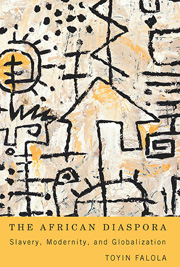Book contents
- Frontmatter
- Dedication
- Contents
- Preface and Acknowledgments
- Introduction: The Old and New African Diaspora
- Part 1 The Old Diaspora: Slavery and Identity Politics
- Part 2 An African Case Study: Yoruba Ethnicity in the Diaspora
- 5 Atlantic Yoruba and the Expanding Frontiers of Yoruba Culture and Politics
- 6 Politics, Slavery, Servitude, and the Construction of Yoruba Identity
- 7 Orisa Music, Dance, and Modernity
- Part 3 The New Diaspora: Transnationalism and Globalization
- Postscript: United States Foreign Policy on Africa in the Twenty-First Century
- Notes
- Bibliography
- Index
5 - Atlantic Yoruba and the Expanding Frontiers of Yoruba Culture and Politics
from Part 2 - An African Case Study: Yoruba Ethnicity in the Diaspora
Published online by Cambridge University Press: 05 September 2013
- Frontmatter
- Dedication
- Contents
- Preface and Acknowledgments
- Introduction: The Old and New African Diaspora
- Part 1 The Old Diaspora: Slavery and Identity Politics
- Part 2 An African Case Study: Yoruba Ethnicity in the Diaspora
- 5 Atlantic Yoruba and the Expanding Frontiers of Yoruba Culture and Politics
- 6 Politics, Slavery, Servitude, and the Construction of Yoruba Identity
- 7 Orisa Music, Dance, and Modernity
- Part 3 The New Diaspora: Transnationalism and Globalization
- Postscript: United States Foreign Policy on Africa in the Twenty-First Century
- Notes
- Bibliography
- Index
Summary
The Yoruba have become truly global in their locations in different parts of the world; the representations of various aspects of their culture (including religion, philosophy, worldview, economic practices like the “esusu,” art, music, dress, and cuisine) in their new locations; the distinctive Yoruba Orisa traditions in the Americas; their physical presence in various parts of the world, either as the descendants of Yoruba people taken as slaves between the seventeenth and nineteenth centuries or as Yoruba voluntary migrants in the contemporary era; and the integration of Yoruba into academic fields such as African, Diaspora, Black Atlantic, and Atlantic History Studies.
The geographic location of this chapter is the Atlantic, a site that unites the Yoruba in Nigeria with the coastal areas of West Africa, Europe, and the Americas. Within this Atlantic unit, the Yoruba are located far and wide, not just along the coastlines but in the hinterland as well. The Yoruba in diaspora reveal to us profound imaginations of diasporic movements and connections; processes and outcomes of cultural hybridization and identity formation; and strategies of adaptation and social integration in diverse locations in different historical formations.
Yoruba oral narratives have actually privileged diasporic events and episodes. Our early mythologies are actually inaugurated by a diaspora: stories of princes leaving Ile-Ife to establish kingdoms, settlements, and towns are narratives of a diaspora in formation. As the scattered princes of Ile-Ife were linked to an ancestor—Oduduwa—the unity in diversity was inscribed through and reinforced by ceremonies and festivals.
- Type
- Chapter
- Information
- The African DiasporaSlavery, Modernity, and Globalization, pp. 118 - 162Publisher: Boydell & BrewerPrint publication year: 2013



